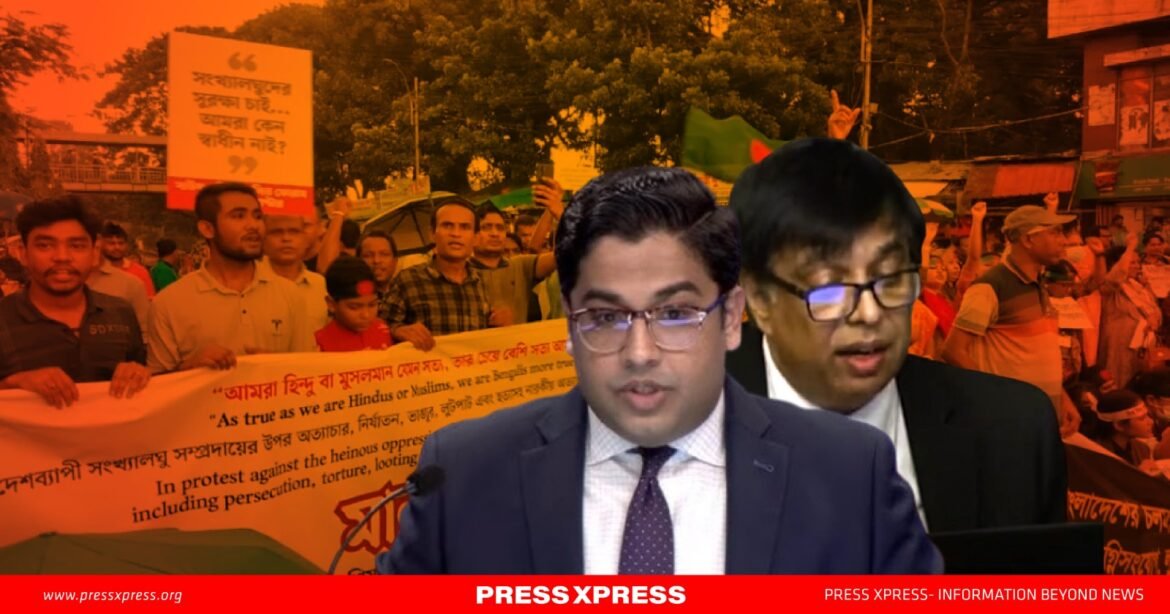As international concern grows amid rising violence against minorities and alleged illegal detention of ISKCON’s Chinmoy Das in Bangladesh; these issues highlight a critical need for safeguarding the fundamental rights of religious communities in Bangladesh.
In light of growing concerns raised by British Members of Parliament (MPs) Barry Gardiner and Priti Patel, the U.S. government is under increasing pressure to respond to reports of escalating violence against Hindus in Bangladesh. Over 2,000 violent incidents targeting this minority community have sparked international alarm, with calls for stronger protection and the upholding of religious freedom.
The issue has escalated to a point where both British and U.S. authorities are being urged to take diplomatic and policy measures to safeguard religious minorities and ensure law and order in Bangladesh. Moreover, at the same time, the U.S. government is under mounting pressure to address the illegal detention of Chinmoy Das Brahmachari, a leader of ISKCON Bangladesh, and ensure that human rights and religious freedoms are upheld.
Concerns Raised in the UK Parliament and US States Dept.
In a heated discussion within the UK parliament, MPs Barry Gardiner and Priti Patel underscored the alarming rise in violent attacks against Hindus in Bangladesh. These incidents have left many in fear for their safety, leading to a call for urgent governmental intervention. As the situation grows dire, both MPs are pushing for diplomatic dialogue between the U.K. and Bangladesh to address the violence, ensuring that religious freedom and the protection of minority communities are paramount.
The incidents of violence include physical attacks on Hindu temples, as well as assaults on individuals. These incidents have reportedly led to widespread displacement and fear among Hindu families, with many members of the community forced into hiding. The government’s failure to prevent such attacks or bring the perpetrators to justice has raised serious human rights concerns, prompting the international community to demand accountability and action.
U.S. Stance on Human Rights and Religious Freedom
In response to these growing concerns, Press Xpress’s Bureau Chief, Dastagir Jahangir, raised the issue with U.S. officials, seeking clarity on whether the United States would take diplomatic action to address the situation.
U.S. spokesperson, Mr. Patel, responded by reiterating the U.S. government’s longstanding position on human rights, particularly the protection of religious freedom. “We are consistent with every government in which we have a relationship with – we are clear that there needs to be the respect of fundamental freedoms; there needs to be respect of religious freedom and basic human rights,” Mr. Patel emphasized.
The U.S. government has expressed a commitment to supporting religious freedom and human rights across the globe, and this includes ensuring that Bangladesh’s religious minorities, particularly Hindus, are safe from violence and discrimination. Patel also noted that protests should remain peaceful and that any government crackdown must respect the rule of law and the rights of individuals. This commitment is in line with the broader U.S. foreign policy, which prioritizes the defense of fundamental freedoms and democratic values.
US Stresses for Legal Concerns for the Case of Chinmoy Das Brahmachari
A particularly troubling development that has emerged alongside these concerns is the case of Chinmoy Das Brahmachari, a prominent leader of the International Society for Krishna Consciousness (ISKCON) in Bangladesh. According to reports, Brahmachari was illegally detained and imprisoned, and his lawyer was allegedly beaten into submission, forcing him into the hospital. The lack of legal representation has sparked alarm among human rights advocates, with fears that Brahmachari’s detention may be part of a larger crackdown on religious figures and minority communities in the country.
When asked about the U.S. government’s stance on the case, Mr. Patel expressed concern, stating that while he did not have the full details of the incident, the U.S. position remains firm on the treatment of detainees. “Even those who are in detention need to be afforded appropriate representation and need to be treated with basic fundamental freedoms and human rights,” he said. This statement reinforces the U.S. government’s call for legal protections for individuals in Bangladesh, particularly those who are politically or religiously marginalized.
The legal harassment of Chinmoy Das Brahmachari is part of a broader pattern of repression affecting religious minorities and activists in Bangladesh. Reports of unlawful arrests, violent assaults, and intimidation have sparked fears of an increasingly authoritarian climate under the current government. The U.S. government, through its diplomatic channels, continues to press for respect for human rights and legal protections for all citizens, including religious leaders like Brahmachari.
Diplomatic Engagement and Future Actions
Given the severity of the situation, diplomatic engagement between the U.S. and Bangladesh will likely intensify in the coming months. The U.S. has expressed its commitment to continuing its conversations with the Bangladeshi government, urging them to address the underlying issues of religious intolerance, human rights violations, and the erosion of legal protections.
Furthermore, international pressure from other nations, including the U.K., will likely play a pivotal role in influencing Bangladesh’s actions. By leveraging diplomatic channels and offering support for initiatives that promote human rights, the U.S. hopes to see tangible improvements in the safety and freedom of religious minorities in Bangladesh.


